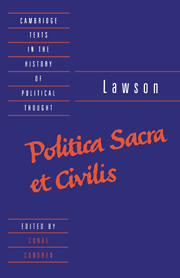Book contents
- Frontmatter
- Contents
- Preface
- Editor's introduction
- A note on the text
- Bibliographical guide
- Biographical notes
- Principal dates
- Politica Sacra et Civilis
- Epistle to the reader
- Dedicatory poem
- The arguments of the several chapters
- 1 Of government in general, and the original thereof
- 2 Of government in general, and of a community civil
- 3 Of an ecclesiastical community
- 4 Of a commonwealth in general, and power civil
- 5 Of the manner how civil power is acquired
- 6 Of power ecclesiastical
- 7 Of the manner of acquiring ecclesiastical power
- 8 Of the disposition of power civil, and the several forms of government
- 9 Of the disposition of ecclesiastical power: and first, whether it be due unto the bishop of Rome
- 10 Whether the civil state have any good title to the Power of the Keys
- 11 Whether episcopacy be the primary subject of the Power of the Keys
- 12 Whether presbytery or presbyters be the primary subject of the Power of the Keys
- 13 That the government of the church is not purely democratical, but like that of a free state, wherein the power is in the whole, not in any part, which is the author's judgement
- 14 Of the extent of a particular church
- 15 Of subjection in general, and the subjects of a civil state
- 16 Of subjects in an ecclesiastical polity
- Index
- Title in the series
8 - Of the disposition of power civil, and the several forms of government
Published online by Cambridge University Press: 05 June 2012
- Frontmatter
- Contents
- Preface
- Editor's introduction
- A note on the text
- Bibliographical guide
- Biographical notes
- Principal dates
- Politica Sacra et Civilis
- Epistle to the reader
- Dedicatory poem
- The arguments of the several chapters
- 1 Of government in general, and the original thereof
- 2 Of government in general, and of a community civil
- 3 Of an ecclesiastical community
- 4 Of a commonwealth in general, and power civil
- 5 Of the manner how civil power is acquired
- 6 Of power ecclesiastical
- 7 Of the manner of acquiring ecclesiastical power
- 8 Of the disposition of power civil, and the several forms of government
- 9 Of the disposition of ecclesiastical power: and first, whether it be due unto the bishop of Rome
- 10 Whether the civil state have any good title to the Power of the Keys
- 11 Whether episcopacy be the primary subject of the Power of the Keys
- 12 Whether presbytery or presbyters be the primary subject of the Power of the Keys
- 13 That the government of the church is not purely democratical, but like that of a free state, wherein the power is in the whole, not in any part, which is the author's judgement
- 14 Of the extent of a particular church
- 15 Of subjection in general, and the subjects of a civil state
- 16 Of subjects in an ecclesiastical polity
- Index
- Title in the series
Summary
After the acquisition both of civil and ecclesiastical power, follows the disposition of both, which will take up a great part of this first book. And first of the manner of disposing civil power. This disposition seems to be the same with acquisition, because it cannot be acquired but by a certain subject. Neither can it be said properly to be actually acquired, but at the very same time, and by this very act it's placed in that subject. Yet because power civil may be so communicated and acquired, […] it may be disposed of several ways: and from these several ways of disposing, arise several distinctions and differences of commonwealths. I thought good to make disposition a distinct thing from acquisition, and so handle it for the better understanding of this particular. I will [first] premise some general observations; [then] briefly declare the several ways of disposing majesty, and the several forms of governments. [I shall then] enquire into the constitution of the commonwealth of England; [and finally] deliver some things concerning our condition in these late times.
The observations are these: The [first] which belongs unto that of acquisition, is that no power can be fully acquired, till it be accepted of as well as communicated. For, no man can be bound to be a sovereign against his will.
[Second], that majesty is then disposed, when it is placed and ordered in a certain constant subject, which thereby may be enabled and bound to protect and govern.
- Type
- Chapter
- Information
- Lawson: Politica sacra et civilis , pp. 88 - 125Publisher: Cambridge University PressPrint publication year: 1993



